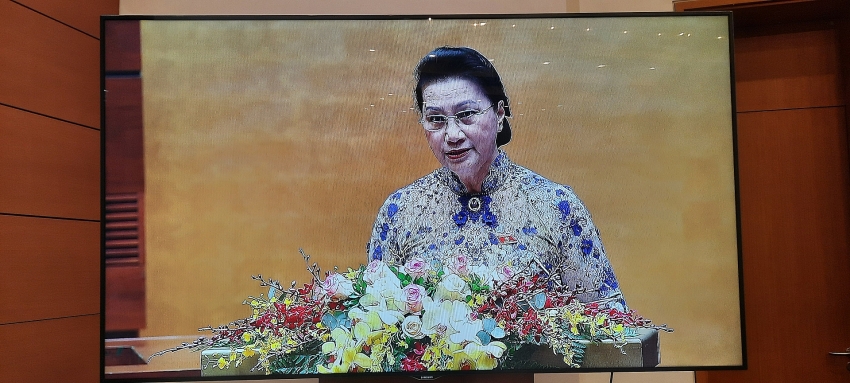National Assembly to select new top leaders
National Assembly Chairwoman Nguyen Thi Kim Ngan stated that the session, scheduled to be wrapped up in April, will elect a new state president, vice president, prime minister, deputy prime ministers, chair and deputy chairs of the National Assembly, members of the cabinet, chief justice of the Supreme People’s Court of Vietnam, and prosecutor general of the Supreme People’s Procuracy.
 |
| National Assembly Chairwoman Nguyen Thi Kim Ngan delivering a speech at the opening session |
At this session, the National Assembly (NA) will use half a day to consider and approve the revised Law on Preventing and Fighting Drugs.
Deputies will also discuss the report on the NA’s 14th term and summary reports of the state president, government, National Assembly Standing Committee, Ethnic Council, the National Assembly’s Committees, Supreme People's Court, Supreme People's Procuracy, and State Audit of Vietnam.
The rest of the time, the National Assembly will consider and decide on other important issues, including seven days for personnel work.
“This session will look back at achievements reaped in the 14th tenure of the National Assembly, while also analysing shortcomings in order to draw out experiences, laying a foundation for the renewal of the upcoming tenure, and creating new momentum for the country to develop further,” said Chairwoman Ngan.
Earlier, the second meeting of the 13th Party Central Committee held on March 8-9 voted on candidates for the posts of state president, prime minister, and National Assembly chairperson for the 2021-2026 tenure, with very high consensus. The lists of those running for these positions have been submitted to the National Assembly for the final vote.
In early February, the 13th National Party Congress was organised and elected the 13th Party Central Committee with 200 members, including 180 official and 20 alternate members. The 13th Party Central Committee then convened its first plenum to elect a Politburo comprising of 18 members.
These members included Nguyen Phu Trong, the Party General Secretary, State President; Prime Minister Nguyen Xuan Phuc; Pham Minh Chinh, head of the Party Central Committee’s Organisation Commission; and Vuong Dinh Hue, Party Secretary of the Hanoi Party Committee and head of the delegation of National Assembly deputies (14th tenure) of Hanoi.
Also at the plenum, Party General Secretary Trong was re-elected as General Secretary of the Party Central Committee in the 13th tenure with very high consensus.
The top leaders are expected to drive the domestic economy forward and accomplish many big macroeconomic goals in 2021-2025. Specifically, the Central Party Committee has adopted an average annual GDP growth rate of 6.5-7 per cent; a level of $4,700-5,000 in per capita GDP by 2025; a ratio of over 25 per cent of GDP contributed by the processing and manufacturing industry; the GDP contribution of the digital economy reaching 20 per cent; a ratio of 45 per cent for total factor productivity in economic growth by 2025; and over 6.5 per cent increase in labour productivity.
In addition, the country’s new leaders will also have to find ways to improve the economy’s competitiveness, with a better business and investment climate offered to enterprises and investors, especially domestic and foreign private ones.
Vietnam currently has nearly 800,000 operational enterprises, about 98 per cent of which are of a small or medium size. According to the General Statistics Office, in 2020, there were 134,900 newly-established enterprises, with the total registered capital of over VND2.23 quadrillion ($96.96 billion), employing more than one million labourers. This was down 2.3 per cent in the number of registered enterprises, but up 29.25 per cent in registered capital.
During 2016-2020, Vietnam’s GDP scale continue expanding at $271.2 billion in 2020, up over 1.4 times from 2015, with per capita GDP of $2,779 which is 1.3 times higher than in 2015.What the stars mean:
★ Poor ★ ★ Promising ★★★ Good ★★★★ Very good ★★★★★ Exceptional
 Tag:
Tag:
Related Contents
Latest News
More News
- Foreign leaders extend congratulations to Party General Secretary To Lam (January 25, 2026 | 10:01)
- 14th National Party Congress wraps up with success (January 25, 2026 | 09:49)
- Congratulations from VFF Central Committee's int’l partners to 14th National Party Congress (January 25, 2026 | 09:46)
- 14th Party Central Committee unanimously elects To Lam as General Secretary (January 23, 2026 | 16:22)
- Worldwide congratulations underscore confidence in Vietnam’s 14th Party Congress (January 23, 2026 | 09:02)
- Political parties, organisations, int’l friends send congratulations to 14th National Party Congress (January 22, 2026 | 09:33)
- Press release on second working day of 14th National Party Congress (January 22, 2026 | 09:19)
- 14th National Party Congress: Japanese media highlight Vietnam’s growth targets (January 21, 2026 | 09:46)
- 14th National Party Congress: Driving force for Vietnam to continue renewal, innovation, breakthroughs (January 21, 2026 | 09:42)
- Vietnam remains spiritual support for progressive forces: Colombian party leader (January 21, 2026 | 08:00)


























 Mobile Version
Mobile Version